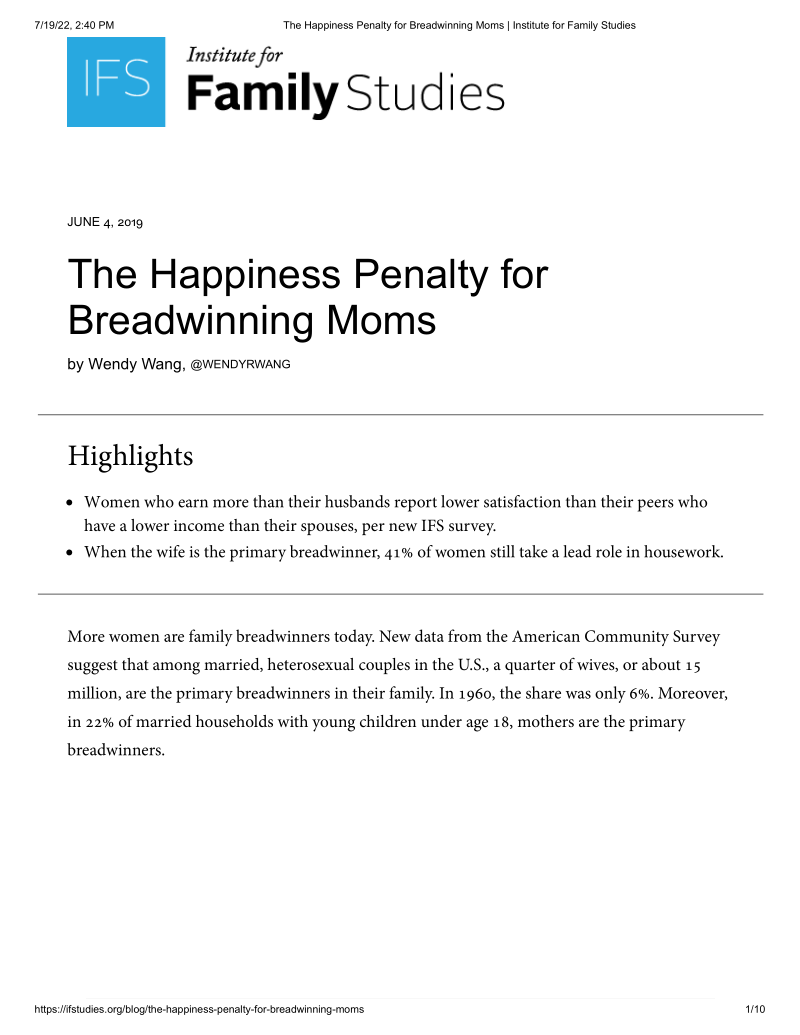Wendy Wang analyzes data that show breadwinning mothers/wives have lower family satisfaction.
- Type
- Website
- Source
- Wendy Wang Non-LDS
- Hearsay
- Direct
- Reference
Wendy Wang, "The Happiness Penalty for Breadwinning Moms," Institute for Family Studies, June 4, 2019, accessed on July 19, 2022
- Scribe/Publisher
- Institute for Family Studies
- People
- Wendy Wang
- Audience
- Reading Public
- Transcription
Women’s progress in the workplace and their economic contributions to their households should be applauded, yet female breadwinners seem to face a “happiness penalty” compared to women who earn less than their husbands.
When it comes to family-life satisfaction, women who earn more than their husbands report lower satisfaction than their peers who have a lower income than their spouses, according to a new Institute for Family Studies/Wheatley Institution survey of U.S. adults ages 18 to 50. Just over half of women who out-earn their husbands (56%) say they are very satisfied with their family life, compared with nearly 70% of women who are not the primary breadwinner in the house. In contrast, the survey suggests that life satisfaction does not differ significantly among married men, whether they are the primary breadwinner or not.
On other measures, including marital satisfaction and whether the couple feels close and engaged in the relationship, female breadwinners also score lower than their peers who earn less than their husbands. And again, these differences are not observed among married men.
. . . .At the bivariate level, breadwinner wives are less satisfied with their family lives than wives who are not the primary breadwinners. Nevertheless, after controlling for other factors, the negative association between the breadwinner role and family life satisfaction is no longer significant for married women overall but is still significant among married mothers. Breadwinner moms are 55% less likely to be very satisfied with their family life than mothers who are not the primary breadwinner, even after controlling for the household division of labor, family financial status, gender ideology, and an array of other background variables.
On the other hand, the connection between the division of housework and family life satisfaction is significant for both married women and married mothers. Doing more housework than their spouse is linked to a lower level of life satisfaction for all married women after controlling for relevant factors. But for mothers, doing more childcare than their spouses is not significantly linked to family life satisfaction.
In sum, findings from the multivariate analyses indicate that that the link between breadwinning and family life satisfaction is more pronounced among married women with children at home. This could reflect the fact that caring for children requires a lot more time and effort on top of regular housework tasks. And when a mother is also the family’s primary breadwinner, the unbalanced workload can take a toll on her family life satisfaction. At a time when more women are family breadwinners, perhaps it is time for husbands to step up and take on more responsibilities on the home front.
. . . .Apparently, the slight income boost among female-breadwinner households is not enough to compensate these women’s lower levels of family life satisfaction. This echoes the previous Pew Research survey finding that sharing household chores trumps money when it comes to a successful marriage.
- Citations in Mormonr Qnas
The B. H. Roberts Foundation is not owned by, operated by, or affiliated with the Church of Jesus Christ of Latter-day Saints.

